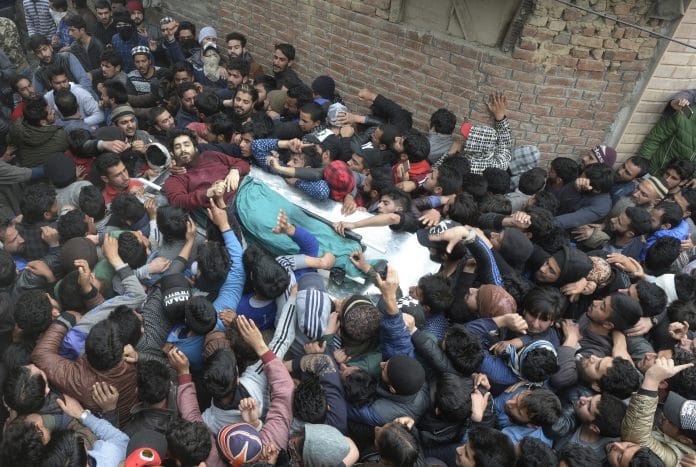Alleged ISIS terrorist Eisa Fazili, killed in a shootout this week, is fast becoming the Burhan Wani of 2018. But one voice in the Valley is challenging his celebration.
Eisa Fazili, the Islamic State of Iraq and Syria (ISIS) terror group’s first suspected recruit in the Valley, was killed in an encounter with security forces on 12 March.
Eyewitnesses say thousands of locals from downtown Srinagar attended his funeral, where the black-and-white ISIS flag draped his body. Rarely before has the flag been flaunted so openly in Srinagar city. But on Monday, it was clearly a show of strength. If Hizbul Mujahideen commander Burhan Wani had brought the hinterland together for his funeral in 2016, Eisa’s funeral was a sea of people raising pro-azadi and pro-Pakistan slogans.
But there is one significant difference — a difference that comes as a ray of hope in times of fear. In what is perhaps the strongest and most scathing indictment of how youngsters are being lured into a sordid interpretation of ‘jihad’, a young Kashmiri named Aamir Ahmad Amin wrote a Facebook post Thursday decrying the “celebration” of Eisa’s “martyrdom”.
Aamir begins the post by identifying himself as Eisa’s classmate and friend, but is quick to distance himself from those calling his friend a hero.
“Just because people are celebrating his ‘martyrdom’ or hailing his actions does not in the least bit validate them or brush aside the fact that he left his mother, a grief-stricken woman who had begged him to return on numerous occasions, for a meaningless and senseless politico-religious battle people wrongly term ‘jihad’,” Aamir writes.
He says Eisa’s family may not say much now, but made impassioned pleas for his safe return earlier. A fact that is corroborated by Eisa’s father Naeem Fazili’s Facebook posts over several months. Naeem had taken to the social networking site a few months ago pleading with his son to come back. Last year, in another post, Naeem had tried to warn his son that he was being used as a pawn by people with vested interests. Naeem reportedly wrote, “I swear you are not on the right track in the light of Quran and Sunnah. Please don’t play with fire. Return as early as possible. Your mum is wandering hither and thither with your belongings in her hands. Mind it, one can never succeed in the absence of prayers of his parents.”
In his post, Aamir writes about how he saw the slow radicalisation of his bright friend. He writes, “I remember the fiery expression on Eisa’s face when someone criticised the then newly mushroomed cult we all know today as ISIS.”
Aamir then speaks on what I think is the most significant part of his post. He writes, “I curse the Wahabi preachers who misled him (Eisa), the Tehreeki leaders who inspired and encouraged him, the careless relatives and friends who never stopped him from taking the leap into the dark abyss.”
“They are all alive and well today – ranting and raving – but Eisa is not,” he adds.
These words reflect the reality of a Valley spiralling out of control. A Valley where a sinister plan to radicalise youngsters is playing out.
Aamir has a note of caution for the young impressionable children who are still in school: “We the younger generation of Kashmir must not let history repeat itself by letting our emotions and feelings cloud our sense of judgement and rationality as our elders have repeatedly done in the past.”
Aamir ends the post asking all the parents reading his post to keep a constant watch on their children, and be on the lookout for any signs of radicalisation. Naming terrorists like Anwar al-Awlaki and Syed Salahuddin, he writes, “They are waiting to sharpen their fangs over young and impressionable minds.”
Given the current situation in the Valley, Aamir has shown unbelievable courage in calling out his terrorist friend. What is even more heartening is that his voice has found hundreds of supporters. Last when I checked, his post had been shared several hundred times with an equal number of positive reactions. Aamir’s words have struck a chord with a society of youngsters stuck between fear and instability. Aamir has questioned a sordid radicalisation process that is gaining roots fast. Let’s pray his voice grows stronger and becomes a chorus.






